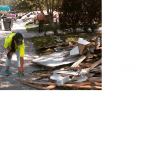sanitation
It’s been nearly a month since Hurricane Harvey made landfall on August 25 off the Gulf coast of Texas. The Houston Chronicle continues its excellent coverage of the massive “clean-up” efforts in cities across the region. Today’s edition features photos and interviews from Dickinson, TX, a town about 30 miles southeast of Houston. More than 7,000 homes in Dickinson were either destroyed or damaged. Officials are telling “weary residents” it’s going to take some time to get all of the debris removed that they’ve placed outside of their houses, apartments, mobile homes.
Jessica Martinez and…
Drivers honked and waved. They gave thumbs up to the 30 people on the sidewalk. The group was holding signs outside a North Carolina poultry plant. “El baño” – the bathroom – was the word catching the drivers’ attention.
The scene on August 14 was a demonstration in front of the Case Farms poultry plant in Morganton, NC. The company supplies chicken to KFC, Popeyes, and Taco Bell.
Alisa Olvera outside of Case Farms poultry plant in Morganton, NC.
The reason for the peaceful protest?
The Case Farms plant has a sanitation problem. Workers don’t have access to the bathroom when they need to…
It wasn’t too long ago that OSHA issued a citation to Allen Harim Foods, a poultry producer in Delaware, for failing to give their workers access to the bathroom.
“Employees were not granted permission to use them [toilets] and/or were not replaced at their lines, waiting up to 40 minutes to use lavatories.”
Today, Oxfam America issued a report which suggests that “holding it” is a situation faced by workers throughout the poultry industry. It’s not just a problem for workers at lesser known companies like, Allen Harim. Workers employed by Tyson Foods, Pilgrim’s Pride, Perdue, Sanderson…
This week’s announcement by Allen Harim Foods offers another upsetting example of a poultry company that cares more about its chickens than its employees. The Delaware-based company broadcasted that it
“…is one of the first companies in the nation that has moved to a 100 percent vegetarian feed for its chickens.”
The firm says the move responds to
“…what our customers are telling us” about wanting to buy healthy chicken products.
I can’t help but wonder how their customers would respond if Allen Harim posed this question to consumers:
“Should the employees who skin, debone and package our…
Consumers beware! A survey of 500 poultry-processing workers in Arkansas found that 62 percent said they have gone to work when they were sick. Why? Only 9 percent of the workers reported they had access to earned sick leave.
Have the flu? No problem. Come to work anyway and cut those chicken tenders.
Suffering from diarrhea? No worries. Come to work anyway and skin those chicken breasts.
The survey results, based on a representative sample of poultry workers in Arkansas, come from a report released today by the Northwest Arkansas Workers' Justice Center (NAWJC). The study, "Wage and Working…
In 2010, New York City health officials launched a new food safety tactic that assigned restaurants an inspection-based letter grade and required that the grade be posted where passersby could easily see it. So, did this grading make a difference? A new study finds that it has, with the probability of restaurants scoring in the A-range up by 35 percent.
To conduct the study, researchers with the New York City Department of Health and Mental Hygiene examined data from more than 43,400 restaurants inspected between 2007 and 2013. A restaurant’s score is based on how well it complies with local…
Serious health problems are driving workers at a car part manufacturer in Alabama to call for a union. In an in-depth article for NBC News, reporter Seth Freed Wessler investigated occupational exposures at the Selma-based Renosol Seating plant, where workers make foam cushions for Hyundai car seats and headrests. According to the story, at least a dozen current and former employees report sinus infections, chronic coughs, bronchitis, shortness of breath and asthma since working at the factory. The story begins with worker Denise Barnett:
Denise Barnett was thankful seven years ago when she…
When President Obama signed the Food Safety Modernization Act (FSMA) into law in 2011, it was described as the most sweeping reform of the nation’s food safety laws in nearly a century. Public health advocates hailed the law for shifting regulatory authority from reaction to prevention. What received less attention was a first-of-its-kind provision that protects workers who expose food safety lawbreakers.
The law’s whistleblower provision, also known as Section 402, amends the federal Food, Drug and Cosmetic Act to provide “protection to employees against retaliation by an entity engaged in…
In a recent study comparing workers at industrial livestock operations and those employed at antibiotic-free livestock operations, researchers found that industrial workers were much more likely to carry livestock-associated strains of drug-resistant Staphylococcus aureus, more commonly and scarily known as MRSA.
First, it's important to note that both groups of workers had a similar prevalence of S. aureus and methicillin-resistant S. Aureus (MRSA); however, it was overwhelmingly workers at industrial livestock operations, sometimes known as concentrated animal feeding operations or CAFOs,…
Here is the second in what will be a series of posts on how little things like changes in technology we take for granted, or simple behaviors, can have a big impact on water use. The first looked at turning off the water when you brush your teeth: a seemingly trivial thing. It turned out not to be so trivial. (I will, on occasion, also blog about the “not so little” things like fundamental changes in our agricultural systems, dietary choices, and industrial processes.)
The Pacific Institute has done extensive and groundbreaking research over the past 25 years on a wide range of water,…
Haiti's cholera epidemic began in October 2010, as the country was still reeling from the devastation of the January 2010 earthquake. The epidemic has now claimed nearly 8,000 lives, and although transmission has slowed, more than 1,500 new cases are still reported each week. Evidence suggests the cholera bacteria arrived in Haiti via UN peacekeepers from Nepal and spread because of an inadequate sanitation system in peacekeeper housing. Last month, however, the UN responded to a compensation lawsuit by invoking immunity under section 29 of the Convention on the Privileges and Immunities of…
by Kim Krisberg
For many migrant farmworkers, the health risks don't stop at the end of the workday. After long, arduous hours in the field, where workers face risks ranging from tractor accidents and musculoskeletal injuries to pesticide exposure and heat stroke, many will return to a home that also poses dangers to their well-being. And quite ironically for a group of workers that harvests our nation's food, one of those housing risks is poor cooking and eating facilities.
A group of researchers and advocates recently decided to take a closer look at such facilities among migrant farmworker…
by Kim Krisberg
After nearly three decades as a USDA food safety inspector, Stan Painter tells me he now feels like "window dressing standing at the end of the line as product whizzes by."
Painter, a poultry inspector with the Food Safety and Inspection Service (FSIS) stationed in the northeast corner of Alabama in the town of Collinsville, is a first-hand witness to USDA's recently proposed rule to speed up poultry inspection lines while simultaneously reducing the number of federal food inspectors and turning over much of the food safety oversight to plant employees, who could have little…
Readers may be familiar with Matt Damon's charity work with water.org, an organization he co-founded. Water.org seeks to raise awareness of the lack of clean water by almost a billion people on earth, and lack of toilets by almost 2.5 billion--and more importantly, they work to remedy that situation by providing sustainable, local solutions. His new video brings awareness in a rather unorthodox manner: he's refusing to go to the bathroom until everyone on earth has access to clean water and toilets.
http://www.youtube.com/watch?feature=player_embedded&v=jQCqNop3CIg
We commemorate today the life of Reverend Martin Luther King, Jr., the inspirational civil rights leader who was assassinated at age 39 in Memphis, Tennessee on April 4, 1968. Rev. King was visiting Memphis to support hundreds of city sanitation workers in their demands for safer working conditions and dignity on the job.
Martin Luther King Jr.
In an interview taped for the StoryCorps project, Mr. Elmore Nickelberry and Mr. Taylor Rogers describe their experience as Memphis sanitation workers in 1968.
Taylor Rogers: "Our day was awful. Everyday. We had these tubs…
Mayor Rudolph Guiliani called them "horrible" and "frightening" (NYTimes July 11, 2000.) The current Mayor, Michael Bloomberg, said they are "repulsive" and announced in 2003 that his administration had "zero tolerance" for them (NYTimes, Aug 15, 2003.) I'm sure their predecessors used equally harsh language to describe New York City's unwelcome inhabitants: rattus norvegicus, a.k.a., the Norway rat. I'm also confident that there have been dozens and dozens of campaigns over the decades to rid their fine city of the rodents.
Credit: Animalfotos.com
The trouble is,…
At Wonkblog, Brad Plumer highlights a new NBER paper that's disappointing to those who hoped that distributing cleaner cookstoves in India and other countries would be an easy way to improve respiratory health and help slow global warming. Many low-cost, traditional cookstoves belch soot, which is bad for the lungs of people who spend long hours near the stoves and for the ice that melts more quickly when soot particles settle on it. Cleaner stoves would improve respiratory health and could run on less fuel, and these changes could be of particular benefit to women, who often spend hours each…
Deborah Sontag's New York Times piece "Haiti's Cholera Outraced the Experts and Tainted the UN" is a reminder that while public attention to the earthquake-ravaged country has waned, cholera still presents a major threat to the country's people. It's also just a sad story about how one apparently small malfunction can have disastrous consequences for an entire nation.
The UN's independent experts concluded that the strain of cholera now afflicting Haitians had come from South Asia, and originated in the tributary behind a base used by Nepalese UN peacekeeiping troops, most likely from a…
Today is World Water Day, and this year's theme is "Water and Food Security." UN Water explains why we should care:
Each of us needs to drink 2 to 4 litres of water every day. But it takes 2 000 to 5 000 litres of water to produce one person's daily food.
Today, there are over 7 billion people to feed on the planet and this number is expected to reach 9 billion by 2050.
To be able to feed everybody, we first need to secure water, in sufficient quantity and adequate quality.
We will also need to produce more food using less water, reduce food wastage and losses, and move towards more…
Two years ago, a 7.0 earthquake struck Haiti, killing 300,000 Haitians and leaving 1.5 million homeless. Nine months later, a cholera epidemic began -- its first victim a 28-year-old man who bathed in and drank from a river that was likely contaminated by raw sewage from an encampment of UN peacekeepers from Nepal. Half a million people have been stricken by cholera since then, and 7,000 have died. New cases are being reported at a rate of roughly 200 per day.
Cholera is also spreading in the Dominican Republic, which shaires the island of Hispaniola with Haiti. Officials from CDC, UNICEF,…

